
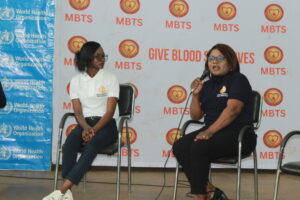
Blood donor manager for MBTS, Mervis Chirwa (right) during the public dialogue
* It’s mostly men who have high turnout in terms of blood donation as compared to women yet in most cases it is women who need blood in various health services
* As Malawi joins the commemoration of World Blood Donor Day, under the theme; ‘Give blood, give hope-Together we save lives’
* Blood transfusion and blood products helps and save millions of lives every year — helping patients who are suffering from life-threatening conditions
* To live longer and with higher quality of life as well as supporting complex medical and surgical procedures—WHO
By Lesnat Kenan, MANA & Duncan Mlanjira, Maravi Express
Malawi Blood Transfusion Service’s (MBTS) is experiencing low blood stocks due to a decline in blood donations across the country — attributed to unfounded fear and cultural beliefs.

Advertisement
During a public dialogue to commemoration of World Blood Donor Day held at Lilongwe Teacher’s Training College, blood donor manager for MBTS, Mervis Chirwa indicated that their blood stocks in blood banks are currently unstable because many people are not coming forward to donate.
“We are appealing to all Malawians to donate blood so we can improve our supply,” she said, she said, while emphasising that fear of the unknown and cultural beliefs are some of the factors contributing to low turn out of blood donors.
She further explained that it’s mostly men who have high turnout in terms of blood donation as compared to women.
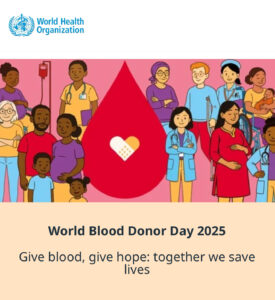
She, therefore, appealed to women between ages 16-25 to take a lead in donating blood, saying in most cases it is women who need blood in various health services.
She added secondary school students between 16-25 years old are the most enthusiastic blood donor as they contribute 70% of the blood stocks.
In his remarks, Dan Kapombosola Banda, head of health & social services at the Malawi Red Cross Society, said in collaboration with MBTS and volunteers, they are encouraging blood donation in various communities by providing training and essential information to help people understand the blood donation process.
“This initiative aims to ensure that the country has an adequate blood supply,” he said.
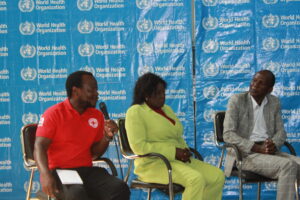
Dan Kapombosola Banda
Malawi is commemorating the World Blood Donor Day today, June 14, under the global theme; ‘Give blood, give hope-Together we save lives’.
In its statement, the World Health Organisation (WHO) pays “a global tribute to the millions of voluntary, unpaid blood donors, who give others a second chance at life”.
“Their generosity saves lives, strengthens communities and embodies the spirit of solidarity. It’s a day to say thank you, but also to spotlight the ongoing, urgent need for safe, regular blood donations.
“This year, we honor hope, the kind you give with every drop of blood and because millions of patients around the world rely on blood transfusions every year, hope flows through every donation.
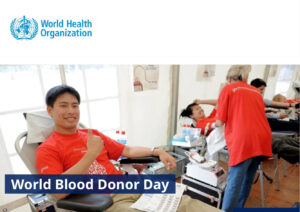
The objectives of the World Blood Donor Day campaign include:
* raise public awareness about the critical need for blood and plasma donations and the impact they have on patients’ lives;
* encourage both new and existing donors to give blood regularly, helping to ensure a stable and sufficient blood supply;
* highlight the positive impact of blood donors on the health and well-being of others and promote the values of solidarity, compassion, and community through blood donation; and
* mobilise support from governments and development partners to invest in and sustain national blood programs to achieve universal access to safe blood transfusion worldwide.

The World Blood Donor Day was first organised in 2004, by four core international organisations — WHO; the International Federation of Red Cross and Red Crescent; International Federation of Blodd Donor Organisations; (IFBDO) and International Society of Blodd Transfusion (ISBT) to raise awareness of the need for safe blood and blood products and to thank blood donors for their voluntary life-saving gifts of blood.
The day is celebrated on the birthday anniversary of Karl Landsteiner on June 14, 1868, who was awarded the Nobel Prize for his discovery of the ABO blood group system.
Each year, WHO highlights that “blood transfusion
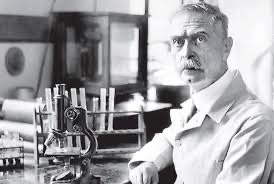
Karl Landsteiner
and blood products helps and save millions of lives every year — helping patients who are suffering from life-threatening conditions to live longer and with higher quality of life as well as supporting complex medical and surgical procedures”.
“It also has an essential, life-saving role in maternal and perinatal care. Access to safe and sufficient blood and blood products can help reduce rates of death and disability due to severe bleeding during delivery and after childbirth.
“In many countries, there is not an adequate supply of safe blood, and blood services face the challenge of making sufficient blood available, while also ensuring its quality and safety.


Advertisement
“An adequate supply can only be assured through regular donations by voluntary unpaid blood donors. The WHO’s goal is for all countries to obtain all their blood supplies from voluntary unpaid donors and in 2014, 60 countries had their national blood supplies based on 99-100% voluntary unpaid blood donations, with 73 countries still largely dependent on family and paid donors.”
Themes in the past few years include:
2024: ‘20 years of celebrating giving-thank you blood donors’;
2023: ‘Give Blood, Give Plasma, Share Life, Share Often’;
2022: ‘Blood donation is an act of solidarity. Join the effort and save lives’;
2021: ‘Give blood and keep the world beating’;
2020: ‘Safe Blood Saves Lives’

